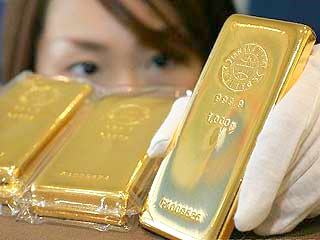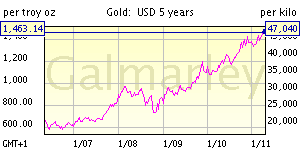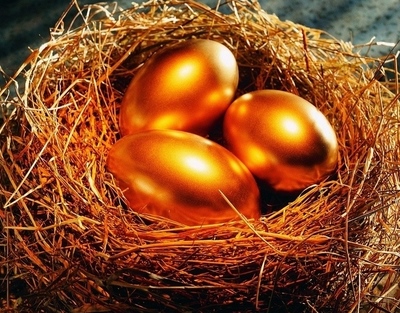
Translated by Andrew Vanburen from
僅佔環球資產千分之一 黃金長線值博
(中文翻譯,請看下面)
GOLD COMPRISES a paltry 0.1% of global assets.
In this era of natural disasters, man-made mayhem and inflationary uncertainty, is it time to revisit the wisdom of precious metals and put more of our money in tangible assets like gold?
Gold has always been around and always will be. It never evolves, adds bells and whistles, changes its stripes or goes high-tech. It is simply “gold.”
Therefore, when people are told to rush into gold on the ground floor, those with substantial existing holdings are naturally inclined to espouse the wisdom of pouring money into the precious metal.
Meanwhile, those with their capital tied up in stocks, bonds, land and lenders are likely to see the non-stop praises heaped upon gold as more cacophony and chatter from “the boy who cried wolf.”
So, the simple up-and-down nature of gold may lack “sexiness” for most investors, but in these volatile times in which we all live – sharing the same planet that we must all do – those who overlook the fundamental benefits of gold investing do so at their own peril.
When wealth and fund managers suggest to their higher-profile clients that perhaps now is a good time to revisit precious metals, the usual response is...”Okay, good point. Let me think about it.”
And the usual result is that a week (or month) later, the wealth/fund manager calls back the said client asking if the thinking process was complete, and also reminding the client that in the week/month since their last communication, LME gold prices have risen 3%/10%!
And all the meanwhile, of course, the wealth/fund manager is biting his tongue in frustration at his client’s lack of initiative.
Another response from investors might be: “You want me to buy gold now? Why? It is at historic highs!”

Fair enough, one might reply, but like the surface population of the planet, some things just keep going up with no visible signs of tapering off, and sudden falls are relatively easy to safely predict in advance.
One correlation to gold worthy of introspection is the property market.
Over the past decade, at least in Hong Kong and the PRC, this has been not only one of the most popular capital landing platforms, but also one of the most volatile.
There were extended periods where the window was open, during which those who took the plunge would have had nothing to regret.

But given that some regarded property investment – whether weed-filled vacant lots or fully-furnished high-rise luxury flats awaiting warm bodies – a timeless, unchanging commodity.
Whether from the caves of prehistory to the harbor-side condos of today, residences still remain stuck in the guise of a roof over one’s head and hopefully a view of the ocean, business district (or approaching predators).
Another fear gripping would-be investors in both property and gold is the ever-present specter of speculation.
While it also exists in the IT, commodities and automobile sectors, it is far less pronounced.
And nowhere else but in precious metals and property do listed counters engaged in either business tend to move in tandem, or as a flock, being so exposed to both macroeconomic shifts and policy reversals.
And let's face it... the concrete differences between two property developers are far more subtle than those between two listed automakers.
The former doesn’t have annual quality surveys to differentiate them or recalls to blacken their name and put a knife in the heart of their valuations overnight.
But when interest rates go up, or global regions implode in civil strife... it is not the share prices of vehicle manufactures that fluctuate violently in a heartbeat.
It is property firms and gold that respond in kind to these major shifts, and that reality will always scare off a large volume of garden variety investors.
Renowned economic thinker Milton Friedman once famously said: “Inflation is always and everywhere a momentary phenomenon.”
What does this have to do with precious metals and how is this always good news for holders of gold?
For anyone who understands the correlation between major global currencies diminishing in value and how gold usually responds, the answer is: everything, especially when for some, the sky seems to literally be falling.
See also: CHOW SANG SANG: Double Digit Growth Seen For 3Q
僅佔環球資產千分之一 黃金長線值博
(文: 黃國英, 豐盛融資資產管理部董事)
叫人買金,難過登天,正因如此,先至抵博。
推介黃金,有禮貌的散戶,或附和曰:「好呀」,但聽後水過鴨背,行動缺缺。更多是:「哇,升咗咁多,好貴呀!以前幾百蚊美金一盎,我都唔買,唔通成千五蚊一盎,先去買咩?不過黃生,好唔好買招商銀行(3968)呢?有無得升呀?」「招行幾蚊雞上市,宜家廿幾蚊,夠升咗幾倍,咁你又恨買呢呵?」此乃散戶不自覺的心理盲點,亦乃黃金值博率的來源。

以古鑑今,回看樓市:2003-2007年,緩緩上升,但投資者稀。2009年海嘯後,樓價墮後急漲,炒樓之風,才趨熾熱,但普羅大眾,仍是心大心細,猶猶疑疑,拒絕上車。及到2010年 底,漲幅加劇,直逼九七,方恍然大悟。投資情緒鐘擺,由嫌三嫌四、恐懼保守,忽然擺到見樓即買、貪婪不已的另一端。前幾年看錯市,滿街平樓不買,當然不會 反思。買本《地產霸權》,自傷自憐,怨天尤人,邊罵邊買,不在話下。事後孔明,當然是「早知沙士買啦!」,但如果投資心法,不斷是唔hit唔買、唔貴無買,只會落得「一世悠悠長,『早知』千百次」的下場。深信幾年後的暢銷書榜,應被《黃金霸權》雄霸。
機構投資者 大大聲 細細注
事實上,機構投資者,雖然看好黃金者眾,亦只是大大聲、細細注。據估計,全球黃金市場的總值,約在1.1萬億美元水平,與此相比,環球股市、債市總值相加,共132萬億美元,金市可謂魚毛蝦仔。而且在該1.1萬億中,可供投資者投資的,如ETFs和金條,僅佔19%。簡單計算,可供投資的黃金,竟只佔環球資產的0.14%!這個比率,等同閣下有一百萬身家,只有1400元的黃金。由此可見,黃金絕對是over-talked, but under-owned的資產類別。
或曰:抗通脹,可以用「與通脹掛鈎債券」出擊(簡稱TIPS),「正!有息收又唔怕通脹,去邊度搵呀?」看似有理,但細心一想,且慢!TIPS實收債息,會與消費者物價指數(CPI,官方的通脹數字)同漲。買TIPS抗通脹,罩門有二:首先,TIPS所用的CPI,是美國而非中、港的通脹數據。美國衰敗如03年的香港,物價升幅,自是較低。用美國TIPS對沖香港生活所需,難言有效,例如交易所掛牌基金TIP,歷史年息率,只是2.8%,跑輸中港CPI一截。此外,通脹難壓,CPI卻可輕易操控:政府可以藉故改變CPI的結構,壓低CPI的數字,從而少付利息。
狂印銀紙激發通脹
「一定有通脹嘅咩?」死心眼如此,可參考佛利民(Milton Friedman)名言:Inflation is a always and everywhere a momentary phenomenon.化成常人能明的語句:通脹是印銀紙印出來的。誰有印鈔機?政府。為什麼政府要狂印銀紙?因為莫水,入不敷支。何故入不敷支?因為福利永不嫌少,派完錢,都怨氣沖天;唔派,搵亞水選你?加上債重息高,越借越大,還到氣咳。當然,中國亦是此道高手,GDP升9%,M2升16%,只是大家唔覺而已。
請看: SPARKLE ROLL Making Fortune From China's Millionaires




